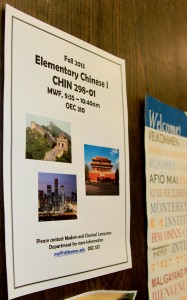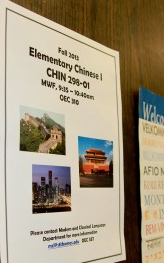Student demand for an Elementary Mandarin Chinese course prompted the languages department to add it in the St. Thomas Undergraduate Catalog starting fall 2013, according to Donald Miller, department of modern and classical languages chair.
Miller said around 25 St. Thomas students register for Mandarin courses at Macalester and Hamline each semester.
“We had international business students who all took Chinese on other campuses come in and do a presentation about a year ago for the department to show how interested they were,” Miller said. “They wanted us to know how much it meant to their future careers and how important it was for business majors to be able to have it here instead of going to ACTC schools.”
The department spent three years conducting various studies on statistics, enrollment and viability of the Mandarin course to determine its beneficiality, Miller said.

One of those studies was a questionnaire conducted in summer 2012. The survey indicated that 89 incoming freshmen were also interested in taking the course.
“We went through a long process to gather research,” Miller said. “After putting all of the research together and discussing how it would affect St. Thomas programs and ACTC Chinese programs, we decided that it still would have many more positives than negatives.”
Freshman Kinza Khan said the course would be helpful for business majors.
“I think it’s a great idea because in the business world, Chinese is really important, especially for people who want to do international business,” Khan said. “I think it would be really cool to learn Chinese if I plan to get a business job in China someday.”
Miller said the course will benefit students in ROTC programs studying non-traditional languages, while preparing engineering majors who plan to study in China. Miller also emphasized the potential benefit the Mandarin course may be to other departments.
“In terms of world relevance these days … majors within the College of Arts and Sciences, Education and so forth could be provided with many opportunities through the Mandarin Chinese course if the program continues to grow,” Miller said.
Depending on the course’s popularity, Miller said Mandarin has the potential of becoming a field of study for students in the future.
“Hopefully, if the program continues to grow, then we can begin to think about it growing as an actual minor on campus,” Miller said. “Or many years down the road, it may become a possible major for students.”
While the languages department committee members are excited about the future of a Mandarin course being offered, planning for the fall 2013 semester remains its main focus.
“We’re searching for an instructor and any qualified candidate can apply through the (Human Resources) website, but beyond that we don’t have a finalist that has been interviewed at this point,” Miller said. “We’re just starting our review process.”
The languages department intends to model the Mandarin course after other universities.
“We’re looking at best practices of teaching languages overall, and we’ll focus on the course work and how the introductory and intermediate courses are taught at Hamline, Macalester and the University of Minnesota,” Miller said. “We’ve been collecting syllabi and seeing what tends to be done commonly.”
Miller said the goal of adding a Mandarin course is to further the university’s ultimate goal of internationalizing itself on campus.
“We are trying to branch out into new fields and studies so that we can give students the greatest possibility of interaction, intercom activity with other cultures, and other societies,” Miller said.
Senior Kelsey Copeland said she isn’t disappointed St. Thomas didn’t offer the course while she was a student at St. Thomas.
“I personally wouldn’t take the course because I’ve heard it’s really difficult,” Copeland said.
Senior Gauthier Mubwa also wouldn’t take the course but feels other students, should take advantage of the opportunity.
“China is such a hot market, and attracts many multinational companies, also the population is huge so the language should be taken into serious consideration by business majors,” Mubwa said. “I think it would be useful for them if they want to stand out, especially in the job market.”
Unlike Copeland and Mubwa, Freshman Kanza Khan who will be at St. Thomas in the fall, expressed her excitement for the course.
“Mandarin is a unique language and probably considered to be more authentic than Spanish, so it’s great that St. Thomas is offering it,” Kahn said. “I would consider taking it.”
Miller said the Mandarin course represents the “ever-evolving face” of St. Thomas.
“It’s not just one culture, one gender, one type of student being represented, but that we are really expanding in our understanding of what it means to be a part of the modern world,” Miller said. “We have a whole new area to explore that just helps us to improve and expand the new endless possibilities.”
Eden Checkol can be reached at chec7168@stthomas.edu.



